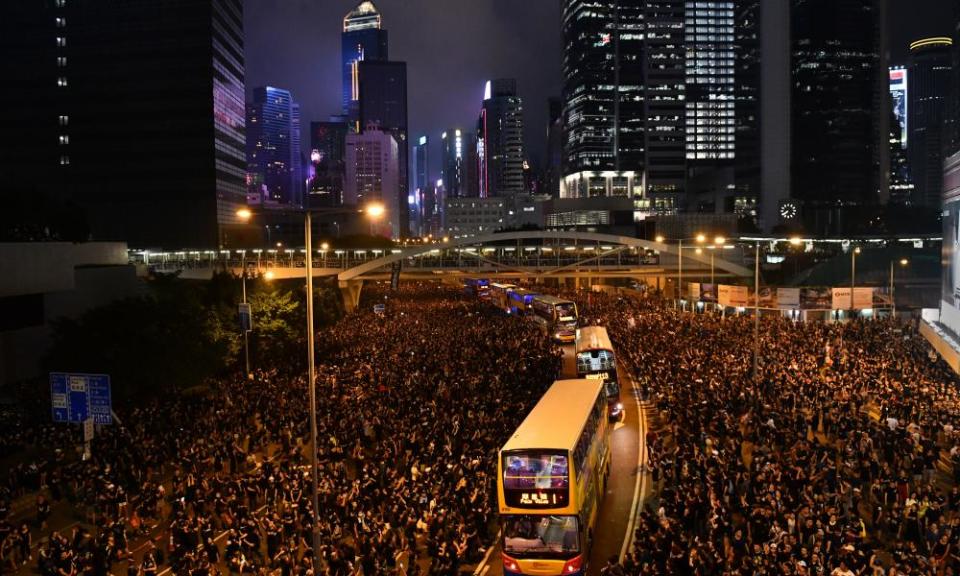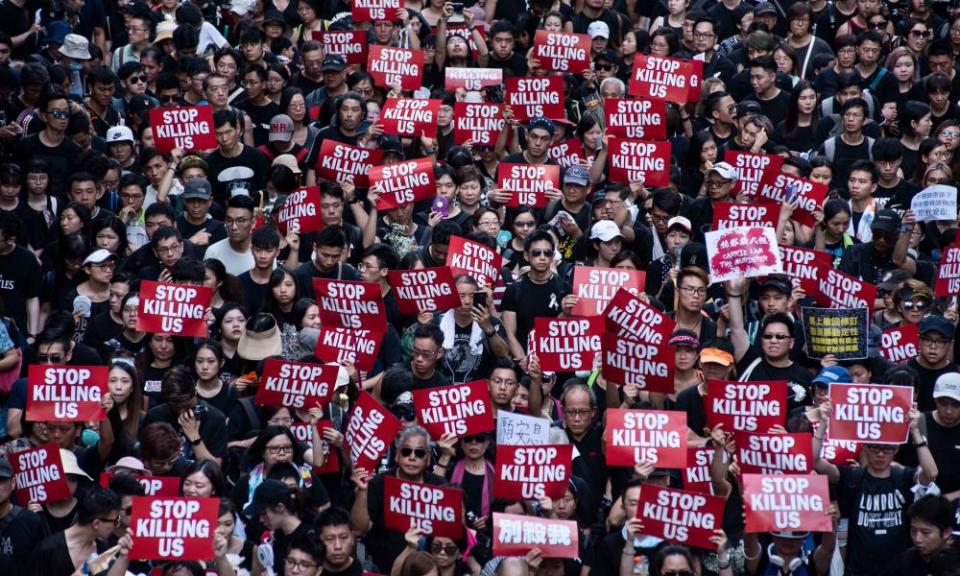‘We have no other choice’: as China erodes democracy Hong Kong citizens prepare to leave

Elisa Wong had always thought she would move away from Hong Kong when her seven-year-old daughter reached university age. But the recent political crisis has prompted her to reach for an application form to emigrate to Australia now.
“I must put in an application as quickly as possible,” the 45-year-old former manager at a bank said. “It’s hard to uproot your family and start again in a new country, but the upheavals in the past weeks have made up my mind.”
Hong Kong has been rocked by its biggest political crisis in decades in the past two weeks – millions have thronged to the streets in downtown business districts to protest a proposed law allowing for the the extradition of suspects to mainland China, where the Communist Party-controlled court system has a conviction rate as high as 99%.
Many Hong Kong people were considering leaving before the recent political turmoil because of exorbitant property prices, high cost of living and notoriously intensive education regime. But the crisis which emanated from the controversial bill has stiffened the resolve of those like Wong to make serious plans to emigrate.
Related: Hong Kong’s elite fear extradition law could harm their reputation
According to a survey conducted in December 2018 and published in January by the Chinese University of Hong Kong, 34% of Hong Kong adults would emigrate if they had the chance. Among this group, 16.2% have already made plans to move. Those who wanted to leave were disproportionately young and well educated: 51% were between the ages of 18 and 30 and 47.9% had college degrees.
Among those inclined to emigrate, three of the top five reasons for leaving were political: 25.7% said there were “too many political disputes and discord”, 17.4% blamed the lack of democracy and their dissatisfaction with the political system and 14.9% were dissatisfied with the Chinese government. Other factors were “crowded living conditions” (25.7%) and high property prices (17.4%).
The three most popular destinations were Canada (18.8%), Australia (18.0%) and Taiwan (11.3%).

Emigration is nothing new in Hong Kong. After the 1984 Sino-British Joint Declaration announced that Hong Kong’s sovereignty would return to China in 1997, emigration consultancy became a prolific business. The Tiananmen crackdown in 1989 spurred a wave of emigration, just eight years before the handover to China.
The government does not keep official statistics on the number of Hong Kongers moving abroad but emigration consultants say that the desire to leave jumped after the 2014 Umbrella Movement failed to force Beijing to grant Hong Kong people an unfettered vote to choose their leader and spiked again this year amid the recent protests.
Willis Fu of the Goldmax Immigration Consulting Co, says enquiries received by his company this year have doubled from last year. And the number of assessment forms it received – a measure of the number of people seriously looking into emigration – has grown from around 30 to 40 a week in March and April to 70 a week in June. The political mood in Hong Kong was clouded by the 30th anniversary of the Tiananmen crackdown on 4 June and the extradition bill, which had been scheduled to pass on 12 June.
I love Hong Kong but we have no other choice ... who would want to leave the place where you grew up?
Elisa Wong
The political crisis this year is unprecedented in Hong Kong’s history: a million people are estimated to have marched on June 9, with hundreds of thousands occupying the main thoroughfares outside the government headquarters on 12 June later being dispersed by police with tear gas and rubber bullets. About two million marched again on 16 June after leader Carrie Lam failed to apologise even though she had suspended the bill.
For Angel Chan, a mother of two preschool children in her 30s, the looming extradition bill, even temporarily shelved, still fills her with trepidation. The “mainlandisation” trend in Hong Kong, including the indoctrination of political ideology and the shift to use Mandarin rather than Cantonese for Chinese classes in schools, casts a shadow over her children.
“You don’t know when they will bring the law back and it will constantly hang over us,” she said. “And what will happen in 2047, when our children are in their 30s? I don’t want my children to be in a place where there is no freedom of thought.”

The One Country-Two Systems policy, put in place after the handover of sovereignty in 1997 to maintain Hong Kong’s status quo for 50 years, runs out in 2047. It is still unclear what Hong Kong’s status would become once that deadline passes, but the political crises in recent years add to the uncertainty of its political future.
Willy Lam, an adjunct professor at the Chinese University of Hong Kong, said even though the extradition bill has been suspended, “it won’t remove the anxiety because Beijing is determined to promote political integration between Hong Kong and China”. This includes infrastructure projects such as a bridge linking Hong Kong, Macau and Southern China’s the Greater Bay Area, a daily quota of 150 mainland Chinese migrants to Hong Kong, and the indoctrination of ideology at schools and the silencing of critical media.
Lam said both waves of emigration, in 1989 and 2019, demonstrated “a serious degree of distrust of the Chinese Communist Party” and are linked with the fear that the Chinese system may encroach upon Hong Kong’s core values like the rule of law, civil rights and freedoms.
Related: Hong Kong streets flooded by extradition bill protesters – in pictures
Even young people active in the recent protests express helplessness and say they too would leave if their efforts to uphold Hong Kong’s current freedoms fail.
“If there is nothing we can do to save Hong Kong, I would focus on working hard in the next few years and seek to move abroad,” said a 24-year-old athlete who identified himself as Tom.
But many say they are actually reluctant to leave their home and emigration is a difficult and unwilling choice.
“I love Hong Kong but we have no other choice,” said Wong. “If things weren’t this bad, who would want to leave the place where you grew up and leave behind your elderly parents and friends?”

 Yahoo News
Yahoo News 